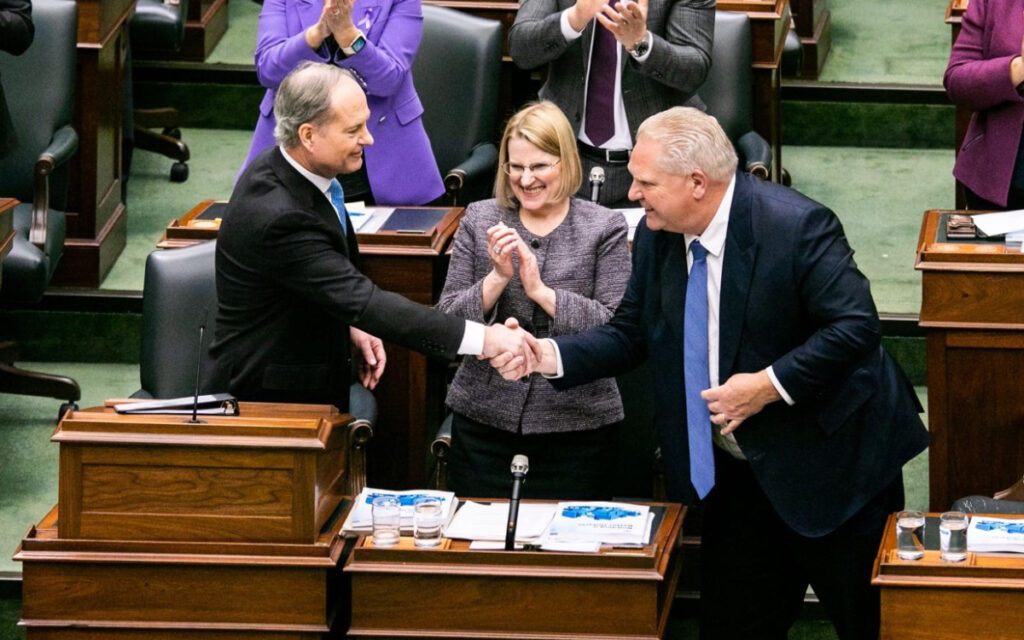
More money for primary care, increased GO service, and a big boost for local winemakers. Photo credit: LinkedIn/Doug Ford.
Earlier this week, the Ford government released its 2024 budget.
The plan, entitled Building a Better Ontario, represents the provincial government’s attempt to balance fiscal responsibility in uncertain economic times with the need to continue investing in the critical infrastructure necessary for housing, healthcare, and transportation.
Though the $214.5 billion budget projects a $9.8 billion deficit for the 2024-25 fiscal year, it estimates a return to balance by 2026 and contains no tax increases.
“In the face of global economic uncertainty and high interest rates that continue to put pressure on Ontario families, our government is taking a responsible approach by investing to rebuild Ontario’s economy without raising taxes,” said Minister of Finance Peter Bethlenfalvy.
While Niagara may not be getting four new police helicopters, there are several items in the 2024 budget that directly benefit the region.
In terms of healthcare, the province is providing a total investment of $546 million over three years, starting this fiscal year, to connect more people to primary care, such as family doctors.
Niagara is explicitly mentioned as a “high-needs area” and will be receiving more than $2.1 million to “increase access to team‐based primary care” in Fort Erie, Port Colborne, Welland, Niagara Falls, and St. Catharines.
The budget also reiterates the government’s near-$50 billion commitment to “the most ambitious plan for hospital expansion in the province’s history,” which includes continued support for the new South Niagara Hospital to completion, and the redevelopment of West Lincoln Memorial Hospital to completion.
On transportation, the budget vows to increase frequency of GO train service between Union Station and Niagara, with more express service between Hamilton, Burlington, and Toronto.
Right now, there are three direct GO train trips to and from Niagara Falls and Union Station every day of the week, including weekends, with the government reporting “increased ridership” on the route.
For the third year in a row, the Garden City Skyway twinning project also made an appearance in the budget document. However, unlike previous years, Bethlenfalvy explicitly mentioned the project by name in his remarks to the Legislature before tabling the budget.
The multi-million project (exact figure yet to be determined) will see the construction of a brand-new bridge over the Welland Canal between St. Catharines and Niagara-on-the-Lake and the refurbishment of the existing bridge.
The province is expected to release a Request for Proposals for the project this spring, with start of construction pegged for early 2025.
Finally, in big news for Niagara’s grape and wine industry, the budget made it official that the province is eliminating the 6.1 per cent tax on wine products sold on-site at Ontario wineries.
The government made a promise to eliminate the levy at the end of last year.
Richard Linley, President of Ontario Craft Wineries, based out of Lincoln, said it was a “historic day”.
“Ontario’s wineries, grape growers and a host of other stakeholders across our value chain will benefit from this change,” said Linley.
The tax is set to be removed this Monday, April 1.
MPP for Niagara West Sam Oosterhoff, Niagara’s lone representative in government at Queen’s Park, commented that the 2024 budget “continues our commitment to build a strong province and a strong Niagara.”
This year’s budget, said Oosterhoff, “outlines a responsible and targeted approach to rebuilding the provincial economy, while continuing to invest in housing enabling infrastructure, highways, transit and health care, without raising costs on families, businesses and municipalities.”




















